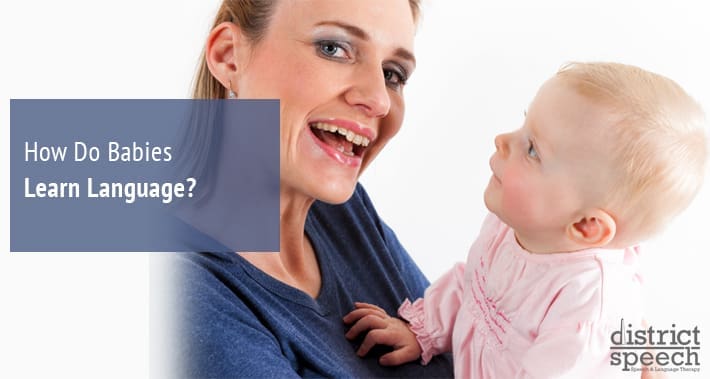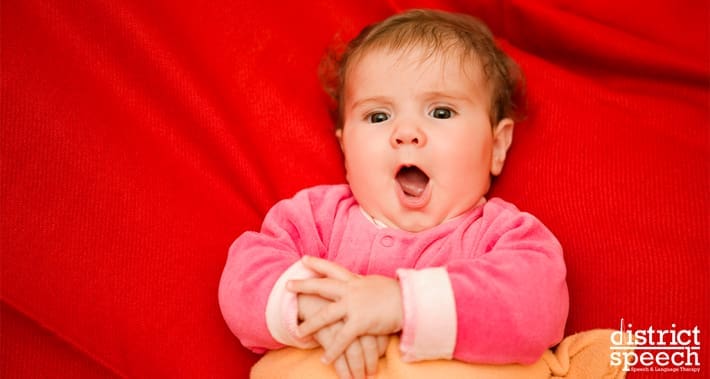
Does it feel like just yesterday your child was babbling, and now they’re speaking in full sentences?
Language development in children happens so quickly it’s easy to miss the stages that are occurring as they learn.
Babies do learn language in distinct stages, starting from the time they’re in the womb.
Your baby will be constantly listening and observing the world around them, getting ready to join in on the conversations you and your family are having.
It’s good to know about the stages of language learning in case you’re unsure if your child is at the same stage as their friends and peers in the same age group.
This can help you spot developmental delays as well, so if you need to seek out a speech language pathologist for children , you can get a head start.
This is extra important, since early intervention speech therapy usually offers better results than waiting until later.
Here at District Speech And Language Therapy in Washington DC, we’ll meet your child where they are, and offer a treatment plan designed to help them address their speech or language disorder.
In the meantime though, keep reading to find out more about the stages of language learning your child will experience.
The Stages Of Language Learning in Children
While it may seem obvious, you may not think about language as something you learn in stages.
Within the first four years of their life your child will go from knowing no language at all to being a (mostly) fluent speaker – that’s pretty amazing.
From before birth until they’re past toddler age, your child will be learning their native language in a natural and gradual way.
There is no exact guide for when children learn language, however.
If your child is not hitting these milestones at the exact times you’re seeing, that’s not a cause for alarm.
While you’ll want to look out for is if your child seems consistently different from other children their age, or if they seem stuck at a certain stage.
Remember that every child grows at their own pace.
However, if the milestone has passed and your child shows no signs of progress, that may be a sign they have a speech or language disorder.
In that case, book an appointment with District Speech – we’ll make sure your child gets the support they need.
Now, let’s take a look at the stages of your child’s language development journey.
Before Birth
While you may think language learning doesn’t start until after birth, research has shown that fetuses actually begin to listen from within the womb.
Babies recognize words that were said to them while they were still in the womb, suggesting that language learning is a pre natal skill.
Of course, this doesn’t happen right away.
During the first and second trimester, the fetus hasn’t yet developed to the point where their brain can understand such things.
However, at around the middle of your final trimester, your baby will have started to listen to what’s being said by you and others around you, while still in utero.
Birth To Six Months
From birth to six months of age your baby is listening attentively to the voices around them.
At this point, there isn’t much they can do other than eat, sleep, fill their diaper, and let you know vociferously when there’s a problem related to one of the above.
So they spend a lot of time observing the world around them, which includes learning to recognize different voices.
At first, your baby will learn to recognize the voice of their primary caregiver, as well as others with whom they spend a lot of time.
If you’ve noticed your baby has different types of cries for different needs, what you’ve actually noticed is language development in your baby.
Vocal play, starting to babble without saying actual words, usually starts at around four months of age.
Six To Twelve Months
At this stage of language development, your baby will usually start to respond to you saying “hi.”
While they’re still likely only babbling or using vocal play, their vocalizations should start to take on a new character.
You still won’t be able to understand them, but you can tell they’re making up what sounds like spoken sentences.
By twelve months your baby will usually start saying their first words.
While they may not have many words in their vocabulary, babies will probably understand much more than they can say at this age.

Twelve To Twenty Four Months
At this age, your baby will be able to understand a lot more – they’ll follow minor instructions and point to different parts of their body.
You’ll probably be able to ask your child questions like, “where’s the book?” and have them respond accordingly.
They’ll start pairing words together to form small sentences, such as “yes food.”
Sing along songs, especially those that have rhymes, will be especially appealing for babies at this age.
Two To Four Years Old
This stage is the stage your child gains a huge amount of their vocabulary.
Not only will their vocabulary skyrocket, but they’ll also be able to string sentences together that contain verbs and adjectives.
They’ll start asking questions and speaking in longer and longer sentences.
At the end of this stage your child is considered fluent in their native language.
Book Your Appointment With District Speech Today
You’ve now read about the stages of language learning in children, but what if your child doesn’t seem to be following these stages?
If you’re concerned about your child’s language development, we’re here to help.
With our speech pathologists helping out, we can work with your child to guide them toward more confidence with language.
Don’t hesitate, book your appointment with District Speech today.
1300 I St NW, Suite 400 E,
Washington, DC 20005
- https://g.page/districtspeech
District Speech and Language Therapy specializes in speech therapy, physical therapy, and occupational therapy solutions, for both children and adults, in the Washington D.C and the Arlington Virginia areas.